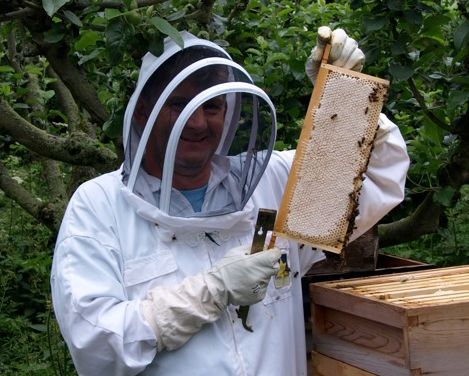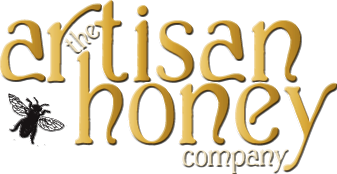Honey
Honey is collected by bees as a gift from most flowering plants, for undertaking the valuable task of pollination. Honey is a natural sugar that has been valued, for its natural sweetness, by man since it was first discovered possibly dripping from bee colonies high up in trees in the early forests. It wasn’t until relatively recently that bees were “kept” by man in hives allowing the management of bees and the harvest of honey for commercial gain. Although Honey is the most popular product of the hive, it was wax that once proved so valuable to commercial beekeepers for its use in candles, cosmetics and a number of other industrial uses. Pollen, propolis and royal jelly also provide valuable income for some beekeepers but is usually beyond the grasp of many. We do hope to provide Pollen in small quantities in the future and will also provide raw propolis to order.
Bees have to work very hard to both collect and then transform “Nectar” into Honey. This transformation is completed through both a physical and chemical process. The physical process is predominantly by the reduction in water content of the nectar from approx 80% (nectar) down to 20% (Honey). The chemical process is achieved by the bees introducing enzymes into the Honey which “inverts” the natural sugars. Once both of these processes have been carried out the Honey is ready for harvest.
Bees live in huge colonies that can amass to over 60 000 in numbers in the high season and it is for this purpose that honey bees collect so much honey, so many mouths to feed. With the colony overwintering as a going concern, although numbers are heavily reduced, some of this honey will ensure the bees are provided for through the winter. The surplus honey is harvested by the beekeeper. The relationship between beekeeper and bee is crucial for both, the beekeeper ensures that the bees are healthy and have a sound hive to live in, the bees respond by increasing in numbers and collecting a surplus of honey.
Honey bees are also excellent engineers and builders as they manufacture the comb on which they will raise their brood and store the honey. Honey can be harvested without extraction and this is often called comb honey. The frames of honey can also be uncapped and the honey removed in a honey spinner. The honey is filtered and decanted into jars, there are no additives’ required to make the honey safe for storage. At the Artisan Honey Company we aim to provide something a little different by the addition for flavour of Chilli or citrus peel, much to many of our customers satisfaction and provides something a little different.
Honey Sales
Honey is normally either liquid, soft set or hard set. All honey starts as liquid but some will soon set or granulate due to the sugar content of the nectar from which the honey was sourced. Each plant produces a different nectar and so each honey will have different properties. Some honey will set or granulate very quickly eg Oil Seed Rape and some will take years to granulate, eg Borage. There is nothing wrong with any honey that has set, it just a natural process and is quickly reversed by the use of gentle heat. Beekeepers have a trick during process by which they can help the honey to stay in between these two states to allow soft set, usually referred to as “Creamed honey”, to be made available.

The relationship between beekeeper and bee is crucial for both, the beekeeper ensures that the bees are healthy and have a sound hive to live in, the bees respond by increasing in numbers and collecting a surplus of honey.


